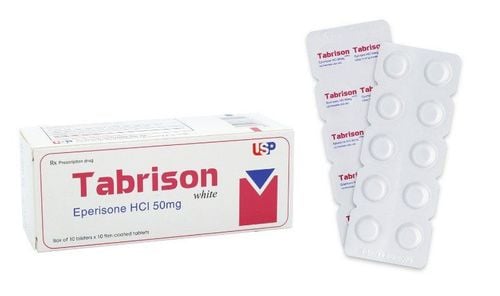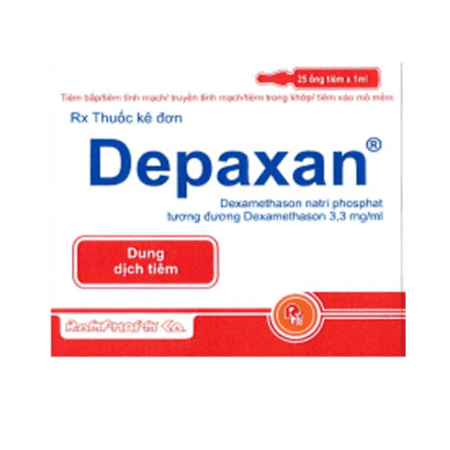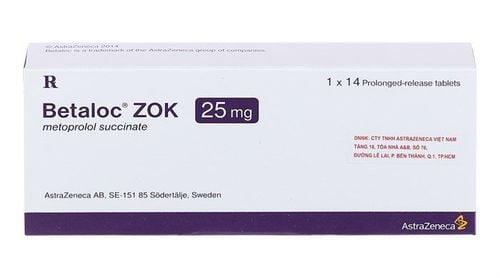This is an automatically translated article.
Richfenac 50 is used in short or long term treatment of musculoskeletal pain, pain after surgery or injury, migraine... Richfenac 50 is a prescription drug, patients need to consult a doctor. doctor and learn some information about uses, doses, and notes when using in the article below.
1. What is Richfenac 50?
Richfenac belongs to the group of pain relievers, antipyretics, non-steroid anti-inflammatory drugs, treatment of Gout and bone and joint diseases. Richfenac is prepared in the form of enteric-coated tablets, packing specifications: Box of 5 blisters, 10 blisters x 10 tablets
Ingredients in Richfenac:
Active ingredient Diclofenac sodium 50mg; Other excipients have sufficient drug content.
2. Indications for taking Richfenac 50
Richfenac 50 is indicated in the treatment of the following conditions:
Long-term treatment of symptoms: Chronic rheumatoid arthritis; Rheumatoid arthritis; Osteoarthritis; Ankylosing spondylitis of the spine; Association syndromes such as Fiessiger-Leroy-Reiter; Rheumatoid arthritis in psoriasis ; Stiffness causes pain and disability. Short-term symptomatic treatment of acute pain of: Rheumatic diseases; Acute post-traumatic injury such as shoulder/forearm periarthritis, tendinitis, bursitis, synovitis or bursitis tendinitis. Treatment of microcrystalline arthritis; Arthropathy; Low back pain ; Severe nerve root pain; Acute typhoid fever; Spine pain syndrome; Extra-articular rheumatism; Pain relief after surgery; Migraine headaches ; Renal and biliary colic; Pain relief after surgery or injury; Treatment of pain or inflammation in gynecology, such as dysmenorrhea, adnexitis; Support in the treatment of ear - nose - throat infections, such as pharyngitis, otitis.
3. Dosage, how to use Richfenac 50
The dose of Richfenac 50 should be calculated carefully, depending on the needs and response of the individual patient and the lowest effective dose should be used.
Dosage of Richfenac 50 refer to the following:
Ankylosing spondylitis: Take Richfenac dose 100 - 125mg/day, divided into 2-3 times a day. Osteoarthritis: Oral dose of Richfenac 100 - 150mg / day, divided 2 to 3 times a day. Long-term treatment is 100mg/day, no higher dose should be used. Joint damage: Take 1 dose of Richfenac 100mg/day in the evening before going to bed or take 50mg in 2 divided doses/day. Rheumatoid arthritis: Oral dose of Richfenac 100-200mg/day, divided into 3 or 4 times. The maximum total dose is 200mg/day. Long-term treatment of rheumatoid arthritis: The recommended dose of Richfenac is 100mg/day and if necessary increased to 200mg/day in 2 divided doses. Juvenile polymyalgia rheumatica: Children from 1 to 12 years old use Richfenac dose 1-3mg/kg/day, divided into 2-3 oral doses. Treatment of acute pain or primary dysmenorrhea: 50mg, 3 times a day. Recurrent pain, recurrent dysmenorrhea: The first dose of Richfenac is 100mg, then 50mg, 3 times a day. The maximum recommended daily dose of Richfenac is 200 mg on day 1, then 150 mg/day. Postoperative pain: Richfenac 75mg, intramuscular injection twice daily or 100mg suppository placed in rectum twice daily. For patients undergoing hip replacement surgery: Initial dose is 75mg intravenously, then 5mg/hour (used with Fentanyl). Pain in cancer: Use Richfenac 100mg, twice a day. Note: The above dose of Richfenac 50 is for reference only. The specific dose of Richfenac 50 will depend on your condition and disease progression. To get the right dose of Richfenac 50, patients need to consult their doctor/pharmacist.
4. Contraindications to using Richfenac 50
Richfenac 50 is contraindicated in the following cases:
Stomach ulcers; Hypersensitivity to the active substance in the drug Richfenac; Contraindicated in patients with bronchial asthma, urticaria, acute rhinitis when taking acetylsalicylic acid or other prostaglandin synthesis inhibitors. Contraindication is understood as an absolute contraindication, so it is not for any reason that contraindications can be flexible to use Richfenac 50.
5. Interactions with drugs
Richfenac may increase the concentration of Lithium and Digoxine when taken together. Richfenac may inhibit the effects of diuretics. Concomitant treatment with potassium-sparing diuretics may cause hyperkalemia. Concurrent use of Richfenac with multiple nonsteroidal anti-inflammatory drugs or glucocorticoids will increase unwanted side effects. Co-administration of Richfenac with oral antidiabetic agents did not change the clinical effect. However, some people may experience low or high blood sugar after taking Richfenac. In these cases, the dose of antidiabetic drugs should be adjusted. Caution should be exercised when Richfenac is administered less than 24 hours before or after treatment with Methotrexate, as its blood levels and toxicity may be increased. To avoid unwanted interactions when using Richfenac 50, patients should inform their doctor/pharmacist of all medicines, dietary supplements, vitamins and herbs... they are taking.
6. Side effects of the drug Richfenac 50
Possible side effects of Richfenac include:
Epigastric pain; Digestive disorders such as vomiting, diarrhea, abdominal pain, indigestion, loss of appetite; Gastrointestinal bleeding, vomiting blood; Gastrointestinal ulcers; bloody diarrhea; Unspecified hemorrhagic colitis; Exacerbation of ulcerative colitis; Crohn's disease; stomatitis aphter; Glossitis; Lesions in the esophagus; Constipation; histogram enteritis; Pancreatitis; Headache, dizziness; Tired; Sensory disturbances; Memory disorders, disorientation; Visual disturbances; Hearing loss, tinnitus; Insomnia, excitability; Convulsions; Depression, anxiety, tremors; Taste disorder; Skin rash; Hives; Rash with blisters; Eczema, skin redness; Erythema multiforme; StevensJohnson syndrome; Lyell's syndrome; Hair loss; Photosensitive response; Purpura; Acute renal failure; Blood in urine ; Proteinuria; Interstitial nephritis, nephrotic syndrome; Renal papillary necrosis; Increased serum transaminases; Hepatitis; Thrombocytopenia/leukopenia, agranulocytosis; Hemolytic anemia, aplastic anemia; Asthma; Anaphylactic reactions; Lower blood pressure; Vasculitis; Pneumonia; Palpitations, chest pain; High blood pressure; Heart failure; Administration of the injection form may cause pain and stiffness, abscess or necrosis of the intramuscular injection area. If there are any abnormal symptoms suspected of using Richfenac 50, the patient should notify the treating doctor/pharmacist for timely treatment.
The basic information about Richfenac 50 in the above article is for reference only. Because this is a prescription drug, patients should not arbitrarily use Richfenac 50, but need to contact a specialist directly for a suitable prescription to ensure safety for health.













